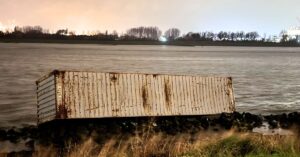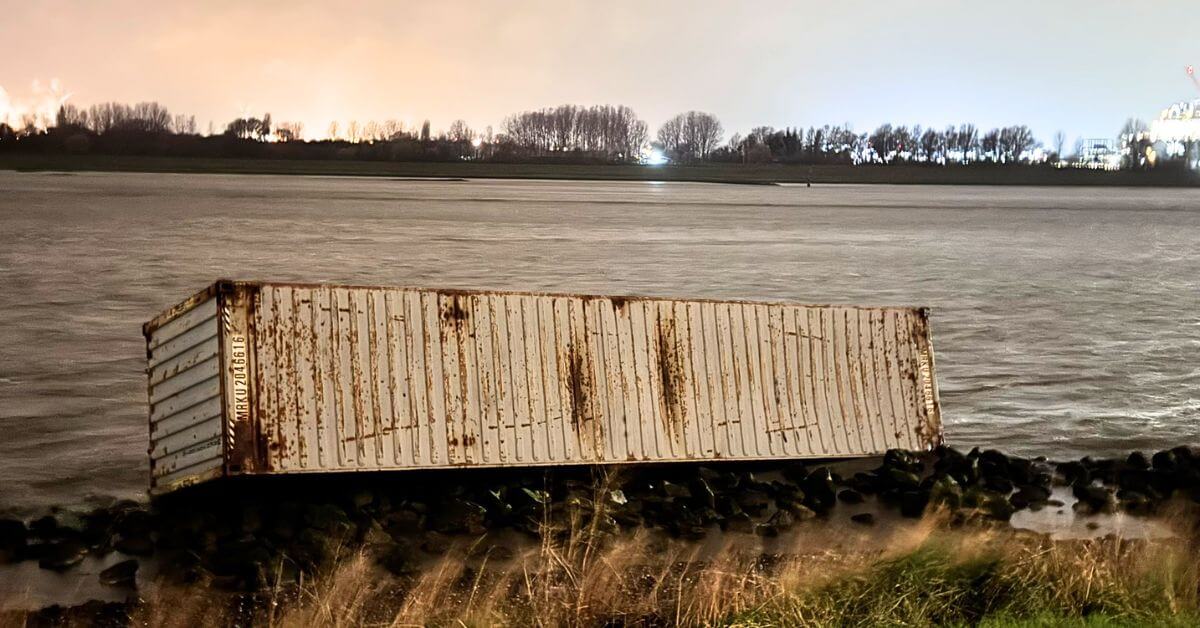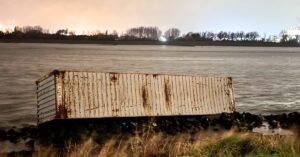
Historic Research Vessel Sinks Unexpectedly Before Scheduled Reefing In Argentina
December 6, 2024
Watch: ICG Collaborates With Pakistani Agency To Rescue 12 Indian Crew Of Sunken Ship In Arabian Sea
December 6, 2024

An autonomous barge and a container ship collided in the Scheur River near Rotterdam on December 5, 2024, spilling at least four empty containers into the water.
The incident happened around 6:15 a.m. near Koning Willem Alexander Boulevard in Maassluis, within the river channel leading into Rotterdam’s inner harbour.
Both vessels remained afloat after the accident, but several containers fell overboard. According to local news reports, at least four empty containers were found washed up on the Maassluis riverbank.
The Hebo Cat 7, a maintenance and salvage vessel, was sent to recover the containers from the shore.
Hoop herrie voor de deur, alles trilde in huis, dacht wat is dat, zie schip heel dicht langs de kant varen. Ben bang te dicht #aanvaring 4 containers langs het Scheur pic.twitter.com/Zc0oozrdm5
— Klaazklikteroplos (@zomer60) December 5, 2024
Image Credits: Klaazklikteroplos/X
One of the vessels involved has been identified as the River Drone 5, part of a fleet of autonomous dry cargo barges operated by a Dutch company.
This barge is one of the first autonomous vessels of its kind in the world. AIS data confirms the River Drone 5 was at the scene of the collision, though it’s still unclear whether the barge was operating in fully autonomous mode at the time.
Other news outlets reported that the barge performed a turn shortly after the collision.
The River Drone fleet is one of Europe’s largest experiments in autonomous and remote-controlled shipping. These barges are equipped with technology that allows them to operate without any crew on board.
Het regent zo hard…ik film even vanuit de auto
#berging #containers pic.twitter.com/sxmZVgRwU1
— Maikel Coomans (@maikelcoomans85) December 5, 2024
Video Credits: Maikel Coomans/X
Each barge is approximately 100 meters long and can carry up to 3,850 tonnes of cargo. The first barge in this fleet started operating in January 2023.
The Netherlands is preparing to update its laws on inland navigation. Starting January 1, 2025, it will be legal to operate commercial vessels on Dutch inland waterways without any crew on board.
Until then, all vessels, whether autonomous or not, must still meet the legal requirements for crew members.
Strict safety measures are needed before adopting these new technologies, which could further improve efficiency and reduce the need for crew members onboard a vessel.
Reference: SeaNews
Source: Maritime Shipping News


